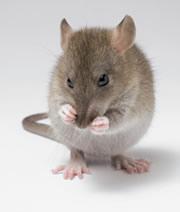 Resting rats run instant replays of their memories.© Getty
Resting rats run instant replays of their memories.© GettyIdlers, loafers and layabouts, listen up. A new study suggests that the times when we sit around twiddling our thumbs could in fact be vital for learning.
The idea stems from experiments in which neuroscientists eavesdropped on the brains of rats as they explored their environments. They found that the rats' brains 'replay' their experiences in reverse when the animals pause briefly to rest.
The scientists, David Foster and Matthew Wilson working at the Massachusetts Institute of Technology in Cambridge, inserted a pincushion of fine wires into the animals' skulls. These allowed the team to simultaneously monitor the electrical activity of around 100 individual brain cells in the hippocampus, a brain region involved in learning and memory.
The researchers placed each wired-up rat in a straight 1.5-metre run. They recorded brain-cell activity as the rats scurried up and down, pausing at each end to eat, groom and scratch their whiskers.
As the rats ran along the track, the nerve cells fired in a very specific sequence. This is not surprising, because certain cells in this region are known to be triggered when an animal passes through a particular spot in a space.
But the researchers were taken aback by what they saw when the rats were resting. Then, the same brain cells replayed the sequence of electrical firing over and over, but in reverse and speeded up. "It's absolutely original; no one has ever seen this before at all," says Edvard Moser, who studies memory at the Norwegian University of Science and Technology in Trondheim.
This instant replay could help the animals to learn about a recent place and what parts of it are most important, the investigators propose. The rerun could coincide with a burst of the reward chemical dopamine, which is released in the brain when the animal finds food.
By playing the pattern of activity backwards, those brain cells nearest the food fire first and at the same time as the dopamine signal. The idea is that this might etch the position of the food into the rats' brains. "It's saying, 'this is the place I want to be'," says Foster.
Time out
If this idea proves true in people, it could have many implications for human learning. It suggests that those idle times, perhaps spent gazing into space, are actually crucial for our brains to replay, and learn from, recent experiences.
The discovery could also help to explain why people tend to learn a new task quicker when they take short rests between each practice round. It suggests that eliminating such breaks could actually interfere with learning, and perhaps even explain why hyperactive children often have learning difficulties.
ADVERTISEMENT
Wilson and his colleagues showed in earlier experiments that rats also replay firing patterns in their sleep, but in the same, forward-running order in which they were experienced. This process could help to firm up memories after the fact, Foster says.
The result is also of keen interest to those who study artificial intelligence and try to teach computer systems or robots to learn through reward and punishment. Some such systems already work by playing back a sequence of moves so that the computer can identify at which point it made the trial or error.
"It's remarkable how it squares up with what we expected," says computational neuroscientist Read Montague at Baylor College of Medicine in Houston, Texas.
Post a comment to this story by visiting our replaymayhelpto_mou.html">newsblog.
